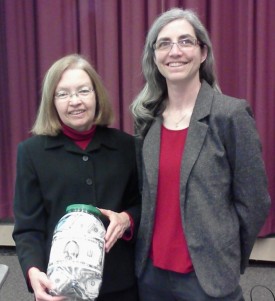As graduation nears for thousands of Rutgers seniors, several dozen students got a jump on important life skills, like better money management, at “Millionaire in the Making,” a lecture on wise financial practices given by Barbara O’Neill, a certified financial planner and Rutgers Cooperative Extension specialist in financial resource management. O’Neill also teaches an undergraduate course called Personal Finance in the Department of Agricultural, Food, and Resource Economics.
The lecture, held at the Cook Campus Center on March 26, was organized to offer college students practical knowledge, life skills, and resources to help them better manage their future and careers. O’Neill indicated that her “Millionaire in the Making” lecture grew out of SEBS professor David Ehrenfeld’s proposal in a public lecture a year ago, that colleges and universities return to life skills education as a means of preparing students for a new world.
“Managing money wisely is an essential life skill,” said O’Neill, who noted that, starting in 2014, New Jersey high school students must take a personal finance course to graduate. “Many of our current Rutgers students, however, have not had this course work previously and may be unaware of key financial concepts and wise money management practices.” O’Neill’s lecture was based on the JumpStart Coalition’s 12 personal finance principles.
“A key point that I always stress to students is that they have two very important resources that can make them a millionaire over time: time and human capital,” noted O’Neill. The latter includes young adults’ knowledge, experiences, skill set, college degree, and good health, all of which increase their marketability to employers. “With the strong emphasis on health sciences here at SEBS, I always remind my students that the greatest wealth is health. Therefore, it is unwise to sacrifice one’s health in a blind pursuit of money.”
Another key point from the lecture is that compound interest can be your best friend or your worst enemy. Compound interest as your “friend” is steadily investing a regular amount at a regular time interval, such as $100 per month. “As you earn more, save more,” advised O’Neill. “If you get a pay raise or pay off debt, kick your savings up a notch.” To find money to set aside, O’Neill advised tracking spending for a month or two to identify spending drains and putting some of this money into savings.
Where compound interest is your “enemy” is paying minimum payments on a credit card. “It could literally take you decades to pay off what you owe,” said O’Neill, who convincingly illustrated the high cost of credit card debt with a calculator. With a $3,000 balance, for example, and minimum payments on an 18% APR credit card, the interest cost is $2,625 ($5,625 total) that will take 14 years to pay off the balance assuming that no further charges are made.
Cook Campus Dean of Undergraduate Education Barbara Turpin, who introduced O’Neill, said, “It was clear that the students’ views were shaped by the recent economy. They were very engaged and interested in what she had to say.” According to Turpin, “O’Neill provided them with information they can use to make informed decisions, rather than trying to tell them what decisions they should make.”
If you missed the lecture, O’Neill’s Millionaire in the Making Power Point presentation is available online. Her 3-credit undergraduate course on Personal Finance is taught each year in the Fall semester as an elective for juniors and seniors.


